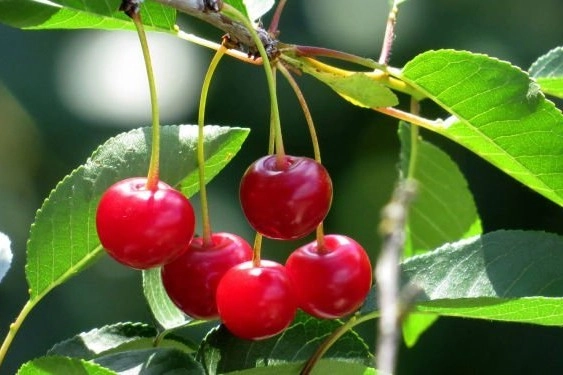The Chilean cherry industry closed the 2023-2024 season with 413,979 tons, highlighting varieties such as Lapins, with 43% of the total volume exported, Santina with 21%, Regina with 19%, and Sweet Heart and Bing with 4% each. Additionally, there are Kordia, with 3%, Skeena with 2%, and Royal Dawn and Rainer both with 1%, among others, according to data provided by the Chilean Cherry Committee.
Portalfruticola.com spoke with the product manager of A.N.A. Chile®, Lorena Pinto, about the new Italian-origin varieties Sweet Saretta and Sweet Stephany, which are being studied as an alternative for early fruit.
Pinto commented that this year representatives of A.N.A. Chile® along with Chilean producers traveled to Spain to see these cherries, developed by Marco Rivoira: "We saw them a month before the harvest, when we could appreciate their size and load, which were spectacular (...) They are quite consistent varieties in terms of quality and some producers had the opportunity to see the harvest."
Pinto emphasized that several trials are being conducted in Chile with Sweet Saretta and Sweet Stephany, "and the caliber we have seen is above 30 and even 32. Additionally, they are self-fertile, so we have solved the pollination problem."
One of the qualities of these varieties is their size. In this regard, the product manager of A.N.A. Chile® expressed that having a large size, they are likely to compete with Lapins or Santina. "In the case of Sweet Saretta, the harvest takes place in the Kordia season and for Sweet Stephany, which is harvested three days before Regina, it is a bit later."
The specialist explained that in Chile, trials are taking place in the O'Higgins region, in the El Tambo area, which "is quite warm and early, so they are harvested in the Satina season, between November 17 and 19." He added that they are collaborating with the University of Talca to measure the requirements of chilling hours, which apparently are not very high.
"We believe that the requirements are low because when it is hot in El Tambo, the variety starts to develop and sprout. Therefore, it is harvested a month earlier compared to trials conducted in Talca or further south, because they do not have enough heat," he said.
Post-harvest
One of the most important characteristics for a cherry is its post-harvest life. In this regard, Pinto stated that the varieties have a fairly thick pedicel, 20° brix, good firmness, and a post-harvest life between 30 and 35 days without problems.
She explained that during the peak cherry production period, producers will face very high competition for prices, so it is essential to differentiate in the market. "With the new varieties, the grower will have an extra profit, because at some point, if we keep planting Lapin, they will be lost, because the variety has a size limit."
In her opinion, it is important that in the medium term, the cherry industry seeks earlier and later varieties. "The new varieties are trying to get out of the curve, but producers who want to have volume in the central part need to replace the old varieties and in the medium term give them an additional benefit," she emphasized.
Another aspect that could be relevant for Chilean growers is that Sweet Saretta is rain-tolerant and has shown good behavior in Italy in terms of rainfall. She added that in Spain more Sweet Stephany is grown and, in terms of agronomic management, more load adjustments are made because it is much more vigorous and reaches interesting sizes.
The fruit
Regarding the quality of the cherries, she explained that the calibers of both varieties are between 30 and 32, and "this can improve commercial conditions and the acidity balances quite well with the brix level. Therefore, when the cherries are tasted after being cold-stored, which will happen in reality, you get a well-balanced cherry."
She indicated that "we also opened them at 40-46 days, which is already an exaggeration, to ask a bit more, so these varieties are suitable for ship travel. These varieties easily reach the brix degrees, but the grower needs to maintain a balance between the number of fruits produced and the tree size."
When asked about the response and interest of Chilean growers, the product manager of A.N.A. Chile® stated that this season many have already requested pre-commercial trials in quantities not less than a few plants, even exceeding one hectare.
In this regard, she explained that soon they will have a volume of fruit from these pre-commercial trials established in the winter of 2023. "These are obviously pioneering stages, so they cannot have unmanageable volumes in this pre-commercial stage," she clarified.
She added that the commercial launch of Sweet Saretta and Sweet Stephany is expected after the 2024 season: "If we repeat the good results of previous years, in terms of harvest, caliber, and productivity, it is very likely that they will be commercially launched in January 2025."
Source: Portal Frutícola
Image: SL Fruit Service
Cherry Times - All rights reserved










